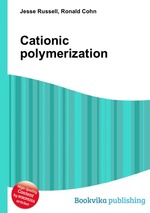Cationic polymerization
Jesse Russell Ronald Cohn
бумажная книга
High Quality Content by WIKIPEDIA articles! Cationic polymerization is a type of chain growth polymerization in which a cationic initiator transfers charge to a monomer which becomes reactive. This reactive monomer goes on to react similarly with other monomers to form a polymer. Poly(isobutylene) used in inner tubes is the only polymer being commercially produced via cationic polymerization. The types of monomers necessary for cationic polymerization are limited to olefins with electron-donating substituents and heterocycles. Similar to anionic polymerization reactions, cationic polymerization reactions are very sensitive to the type of solvent used. Specifically, the ability of a solvent to form free ions will dictate the reactivity of the propagating cationic chain. Cationic polymerization is used in the production of polyisobutylene and poly(N-vinylcarbazole) (PVK).


